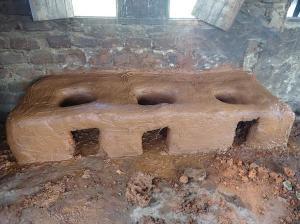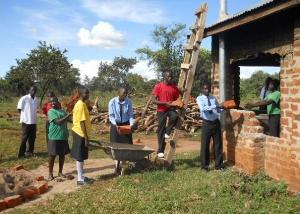Agrippinah Namara
This project will contribute to climate change adaptation and mitigation in the cattle corridor in Nakasongola District, currently threatened by desertification. The overall project goal is to improve livelihoods of rural communities through promotion of climate change mitigation and adaptation mechanisms

The Energy saving stoves constructed by the students.
The pilot project will be implemented by a consortium of organisations including Uganda Nile Discourse Forum, Uganda Wildlife Society and Action Coalition for Climate Change.

The cattle corridor where Nakasongola District lies is prone to climate change impacts due low rainfall, limited tree cover, high temperatures. It is highly vulnerable to prolonged drought alternating with floods and erratic rains. Productivity has steadily declined and poverty levels are high and the region has been described as a severe poverty hotspot. This project will document and share indigenous knowledge on climate change and contribute to the ongoing debates on how best to mitigate and adapt to climate change, and contribute to understanding among practitioners of climate change causes, manifestations and effects at local levels.
By creating awareness among local landowners and farmers on the value of indigenous tree species adapted to the harsh environment, the project will decrease their clearance and persuade farmers to opt to preserve them. Also, the tree cover in the project area will be increased through planting woodlots and trees around households, schools and other institutions.
The project will improve community health and sanitation through promotion of rain water harvesting tanks initially around schools and institutions which will enable people to access clean water. Afforestation combined with awareness on improved community management of wetlands will greatly contribute to environmental conservation, water accessibility and ultimately lead to improved climate. The lives of women and children will particularly be improved, since they carry the responsibilities of water and fuel wood collection, and are most negatively affected by poor sanitation. Improved sanitation among schools and institutions will improve the health of children and the youth.
The project will improved capacity of local governments and NGOs to understand and plan for climate change interventions, and will ultimately increase their prioritisation of climate change adaptation/mitigation interventions in their programs and budgets.